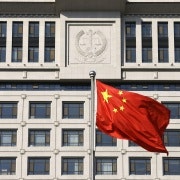One year on, Xi Jinping still has everyone guessing
A year ago Xi Jingping became the head of the world’s biggest political party and second biggest economy. Since then he has moved dramatically to consolidate power, assert his authority and to keep everyone guessing about where he intends to take China.
At the time of his ascendency, he emerged as the most powerful Chinese leader since Deng Xiaoping’s return to power in 1978. Xi acquired the leadership of both the Communist Party and the military. In contrast to his predecessors he did not have a group of party elders looking over his shoulder. Moreover, the reduced Standing Committee of the Party – its highest governing body – meant that no one individual held, as previously, supreme authority over internal security and police, and the propaganda organs.
Over the past year, Xi has launched several ‘campaigns’: a ‘purge’ of political opponents under the guise of an anti-corruption campaign; a ‘rectification’ campaign within the Party to tackle conspicuous displays of extravagant living and waste of public monies by Party and Government officials; and an ideological ‘mass-line campaign’ which harks back to earlier periods which sought to extol virtuous behaviour by Party officials as a model for the wider community.
Xi’s anti-corruption campaign has netted some big figures as he uses it to consolidate further his power. It is widely believed that the main target at this time is former Standing Committee member Zhou Yongkang. Zhou sought to protect former Chongqing Party boss and leadership aspirant, Bo Xilai, at the time of his arrest early last year. Zhou who was head of internal security and police was rumoured at the time to have wanted to stage a coup against the fading leadership of former President Hu Jintao. It is unlikely that such rumours had any basis in fact, but such was the factional tussle over Bo that these things could be spread and believed by many, even if only for a short period. The harshness of Bo’s recent sentence highlights the bitterness of the contest.
Three senior executives in PetroChina – Zhou’s power base – have been arrested, together with other close associates including the Chairman of the State Administration of State-owned Assets Commission and a former Deputy Governor of Sichuan Province. It is most unlikely, however, that Zhou as a former Standing Committee member would be arrested and charged. But his networks of influence and power would now seem to be seriously damaged.
While outside observers can never know the true character of individuals at the centre of Chinese politics, the apparent leftist leanings of Xi have come as a surprise to many who study these things. He was seen as reasonably modern, well-travelled and well educated. Moreover, both he, but particularly his highly esteemed father, suffered at the hands of Mao.
The swing to the left under Xi has involved more positive official references to Mao, including an announcement that a collection of quotes from Mao’s Little Red Book would go back into print, and other bits of colour from the Maoist era.
At the same time, there has been a definite crackdown on expression of more liberal opinion (usually associated with issues around the rule of law, or its absence in China) by academics and the media and on the local social networking sites. People are genuinely hesitant, if not yet frightened, to express their views as freely on WeChat and Weibo as they did just a few months ago. A friend who was daily posting critical and ironic commentary on the Government, now only posts classical poetry as a form of protest over the tighter controls.
Xi’s agenda in all of this is difficult to discern. For sure he does not see himself as China’s Gorbachev. He seeks to strengthen and reaffirm the role of the Communist Party not to preside over its demise. Anti-corruption and Party rectification will be welcomed by many in China as it shows that the Party is prepared to put its own house in order.
A generally held view is that Xi has swung to the left so that in economic matters he can swing to the right – to the direction of market–oriented reforms which could be unveiled at next months all-important Third Plenary Meeting of the 18th Party Congress.
Enough hints in the media and comments by policy advisers to Government suggest that next month’s meeting will contain significant policy guidance in the direction of further reform and opening. It has been a tradition for Third Plenaries to launch major economic policy decisions, as they did in 1978 with the start of reform in agriculture and again in 1984 with the extension of reform to all areas of the economy. Xi’s maneuvering may be confounding but if a significant package of much-needed economic reform is unveiled next month, he will also be seen as a master conjuror.
Dr Geoff Raby is chairman and CEO of Beijing-based advisory firm Geoff Raby & Associates, and a former Australian ambassador to China. He is vice chairman of Macquarie Group China and a Vice Chancellor's Professorial Fellow at Monash University.
















